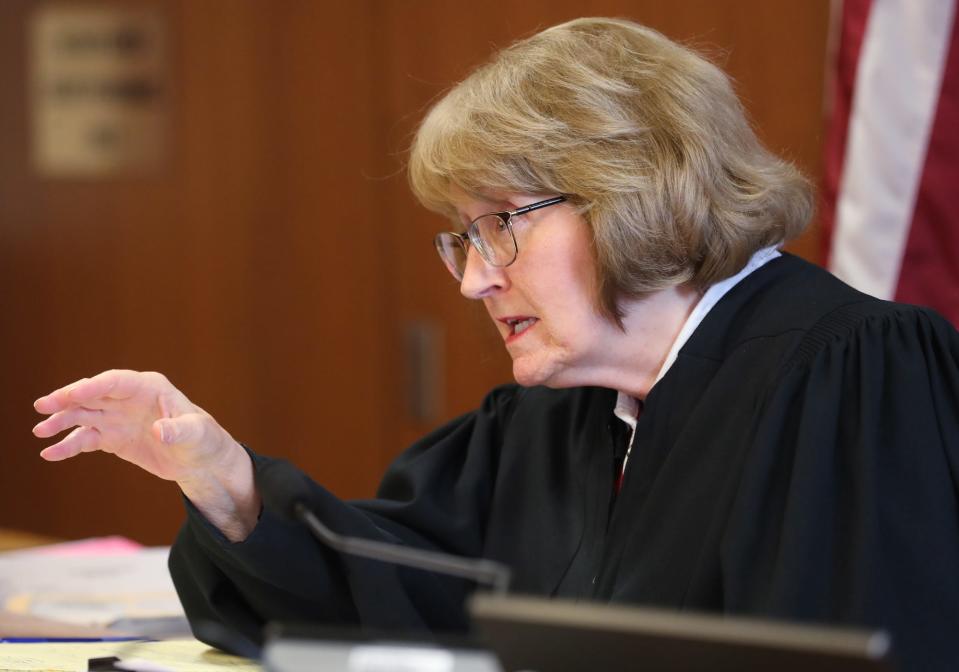Where's the money? Investigator says millions still missing in Mark Dente investment probe

Court-appointed investigator Mark Dottore says there’s probably enough evidence to concern federal officials in former Copley basketball coach Mark Dente's alleged multi-million-dollar "Ponzi scheme."
Dente’s attorney, who unsuccessfully requested a gag order that would have prevented Dottore from speaking about the case, did not return a phone call seeking comment. The lawyer filed a motion Nov. 29 to be removed from all cases, according to court records. It’s unclear if Dente has legal representation in the many lawsuits brought forward by more than 100 former investors.
Dottore is fighting to see the personal finances of some deep-pocketed investors who he says “are definitely net winners, meaning they got more back than they put in.” Additional subpoenas have been filed with banks that Dottore said never blew the whistle on high-dollar deposits Dente and his company, AEM Services, regularly made and withdrew.
And Dottore said there’s another subpoena coming against Arizona-based KeyGlee LLC, which played an integral role that coincided with the meteoric growth of Dente's investment operation. KeyGlee, which is not yet named in any of the cases, has not returned the Beacon Journal’s requests for comment.
Investors have filed nearly 100 lawsuits against Dente and his property-flipping businesses seeking more than $100 million they say they're owed. In June, Summit County visiting Judge Patricia Cosgrove appointed Dottore, a Cleveland mediator, to unravel the mystery of where the money went.

Dottore told the Beacon Journal this month that essentially all assets have been identified. He said he's determined there never were any of the wholesale deals that Dente told investors would make them a lot of money by serving as middlemen for real estate buyers and sellers.
What are the assets worth?
Physical assets identified in the investors’ consolidated lawsuit include six vehicles, a pontoon boat, a jet ski and 21 homes.Dottore, so far, has sold 13 of the homes for $4,875,100, including a vacation property on Portage Lakes owned by Dente’s AEM Services. The other eight properties, including Dente and his wife’s personal home on Weston Court in Copley, are worth $2,892,300 based on appraisals and recent sales reviewed by the Beacon Journal.
“That was pretty much it,” Dottore said. After combing the country, there’s likely nothing more.
The 21 homes are worth $7.8 million, minus costs associated with the sales. The value of the vehicles puts the total retrievable amount close to $10 million. Meanwhile, investors suing Dente hold more than $109 million in notes on loans they gave him.
Some investors, Dottore said, put in $1 million and made $4 million. And Dente handled untold proceeds without a comprehensive ledger. Still, Dottore suspects that close to $200 million flowed in and out of what he and the state of Ohio have called a multi-year “Ponzi scheme.”
Dottore said a relative of Dente who now lives in Kansas City is cooperating.
"We seem to have recovered $500,000 from this guy,” Dottore said before a hearing last week on how the relative — “maybe a nephew or a cousin” — came to possess money from Dente.
How Dente’s operation worked
Dente promised lucrative returns of up to 30% on short-term loans. Investors could pull their money out in 60 to 90 days or let it ride, as many regretfully did.
Hundreds of people —from wealth-managed pools of investors and a fellow coach in Copley to retirees and people who took out mortgages and bank loans for a piece of the action — never saw their money again.
The loans were supposed to finance Dente’s house-flipping and wholesale business.
The bets paid off, initially, as investors doubled down on future loans. The borrowing topped $100 million before signs of trouble surfaced late last year.
Bigger investors started cashing out or directing others to invest directly with Dente and not through them. As they called their loans due, Dente paid up until his business, AEM Services, began telling investors to stop calling him and to expect delays in getting their money.
Possible SEC violation?
Throughout the process, Dottore said investors sometimes deposited their “I owe you” slips — cognovit notes, in this case — into their retirement accounts. The notes would increase in value like any other good investment, but with one perilously legal distinction.
“It's clearly an unlicensed security,” said Dottore. “I mean that, Ray Charles could see that.”
Legitimate investments must be registered with the U.S. Securities and Exchange Commission, which has the authority to investigate investor fraud.
Even if there were any investigations underway, Dottore said he would not be permitted to talk openly about communications with the SEC, which has a policy of not talking to reporters about potential cases or individual investors.
“We don't know if Securities and Exchange is going to show up or not, we're not sure,” said Dottore. “We don't know what's going to happen.”
‘Not the most sophisticated guy’
Dottore said that in 40 years of investigating Ponzi schemes, perpetrators always have a plan to walk away a winner from the revolving process of taking on new debt to repay old loans.
“This guy had no exit strategy, because there's no way he would ever get out of this,” Dottore said of Dente, who he called “not the most sophisticated guy.”
More: Foul play? Former Copley coach Mark Dente accused of defaulting on $53.1 million in loans
Dottore submitted a second round of subpoenas in September to Keybank, Fifth Third Bank, Dollar Bank, Huntington Bank and PNC Bank, hoping to see how Dente moved the money. He’s also seeking records and invoices from a home remodeling company and a title agency involved in the relatively few physical property deals.
The company that sold Dente the clout to ‘legitimize the money cycling’
Dente was KeyGlee’s biggest customer, giving the winning basketball coach with a word-of-mouth business a national list of market-ready properties to show prospective investors.
KeyGlee, headquartered in Tempe, Arizona, works like a clearinghouse for wholesalers, according to some of Dente’s investors, Dottore and two franchise owners who are trying to get out of contracts with KeyGlee and can't talk publicly due to non-disclosure agreements.
It starts with roadside signs offering cash for houses. Homeowners call the numbers on the signs and are entered into a database of potential sellers. The sellers are bundled by market and their information is sold for $100,000 per package as franchises to people in the real estate and house-flipping industry. KeyGlee, which collects 15% of sales as a royalty fee, has its franchisees use proprietary software to access property listings and record transactions.
It's that information that Dottore would subpoena to confirm that Dente was never wholesaling property and just showing his capacity to wholesale when selling investors on his business.
One KeyGlee franchisee told the Beacon Journal this year about KeyGlee-led monthly calls with other franchise owners. None of them owned more than two or three franchises.
“Probably around January 2021 is when all of a sudden we were seeing AEM, AEM, AEM, AEM buying all these franchises. Now, you have to understand the weirdness of this first of all,” said the franchise owner, explaining that Dente and AEM came to own 18 franchises, sometimes in markets that already had a franchisee.
“It gives Dente a vehicle to legitimize the money cycling that he's doing,” said the franchise owner.
The franchisee said KeyGlee’s lists of properties are no better than what can be found in public and other databases. They don’t give wholesalers an edge. And they come with steep penalties for franchisees who try to end their contracts.
KeyGlee emailed one franchise owner a contract termination notice for lack of royalty and other payments. The Beacon Journal acquired a copy, which detailed a more than $500,000 penalty on “future royalties,” an unpaid software and past royalty fees, and a $10,000 termination fee.
"It's like buying a freaking timeshare," said Dottore.
The receiver is considering a class action lawsuit on behalf of disgruntled KeyGlee customers who say the Dente scandal has tarnished a product that never lived up to its promise.
“There's always some Ponzi scheme in the Ponzi scheme,” said Dottore. “And [Dente] buys these KeyGlee franchises because he needed to get properties. ... Now I know for a fact there was no wholesaling. It was just money in, money out."
For tips or comments on this story, email bjnews@thebeaconjournal.com.
This article originally appeared on Akron Beacon Journal: Millions still missing in Mark Dente 'Ponzi scheme' probe

